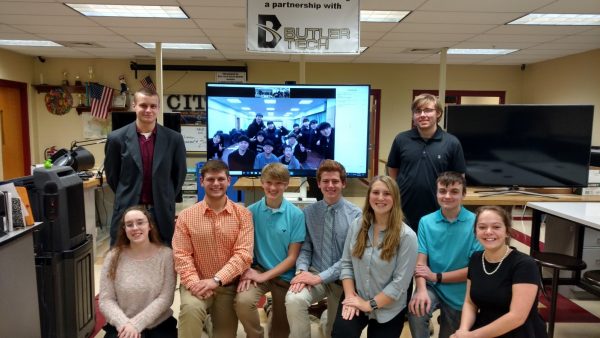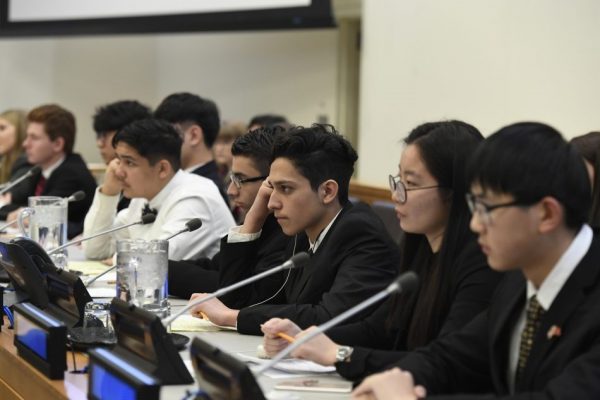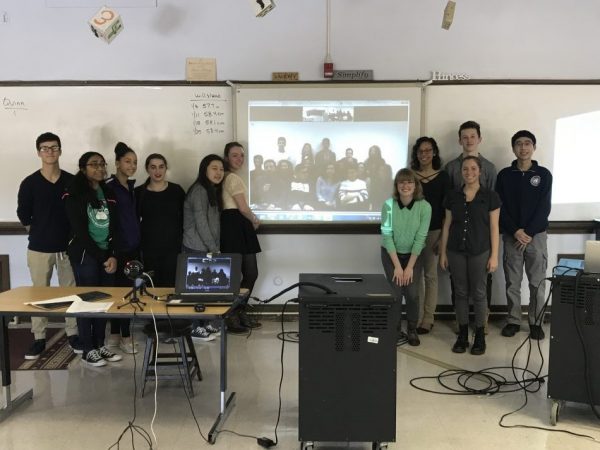This event explored the intercultural integration of global citizenship into STEAM (STEAM stands for science, technology, engineering, arts, and math) education that enables groups of high school students in five countries – Brazil, China, South Korea, Tunisia and the U.S.A. – to work together to solve their community issues. Identifying core competencies required for global citizens in this interdependent society as a driving force to facilitate innovation for a better life. The participating schools shared their experiences including positive impacts and challenges in implementing the STEAM project to develop real-world solutions for the Sustainable Development Goals (SDGs).
Global citizenship education (GCED) understands that individual perspectives and actions impact the values and practices of the local and world community. It empowers learners to proactively participate in resolving challenges around them as well as larger society with compassion for others and respect for human dignity, local cultures, and knowledge systems. Ultimately, the learners become change makers contributing to peace, justice, and sustainable development. Information and Communications Technology (ICT) suggests all students, including those in underserved and developing areas, can have more accessible and cross-culturally collaborative learning opportunities for innovation.
The SDG 4 ensures quality education with an emphasis on global citizenship, and SDG 17 promotes global partnerships enhancing the use of ICT and targeting the science and technology innovation and the cooperation among countries. It is an interdisciplinary learning approach that enables learners to integrate multiple fields of studies for creative, innovative and critical problem-solving. Quality STEAM education is designed to cultivate global citizenship through international project-based collaboration. It also demonstrates the best education is to include SDGs in the curriculum.
This project was made possible due to the partnership of Samsung and Iveca. Using a virtual classroom platform developed by Iveca, a non-profit organization that supports international collaborative learning, students worked in tandem to identify issues in their local communities, share perspectives and develop their presentations.
His Excellency Ambassador Tae-yul, Korean diplomat and the 25th Permanent Representative of the Republic of Korea to the UN, believes that global citizenship and education are two fundamental topics for the 2030 Agenda. One of the most important solutions is bringing up global citizenship because it encompasses human rights, tolerance, empathy, respect and mutual understanding. Education for global citizenship is highlighted in SDG 4. Therefore, today’s education should not be limited to the merely passing of knowledge. Rather, education should provide essential orientation and values for achieving a more tolerant, peaceful and sustainable future.
His Excellency Ambassador Rohan Perera, Sri Lanka diplomat and the Permanent Representative of Sri Lanka to the UN, said that the importance of education is indisputable, it is the basic building block of every society. He wants everyone to have the same education opportunities that he once had. Education is more interconnected than ever before. Therefore, it is necessary to give additional emphasis to global citizenship education which nurtures respect for all, builds a sense of belonging, and helps learners become responsible and active global citizens. Global citizenship education is the education of the future, helping the society to forge a more just, peaceful and tolerant societies.

Team 1 – Ohio, U.S.A. and Busan, South Korea focused on SDGs on SDGs 1 – end poverty and 2 – zero hunger and developed a website and an NGO to collect and distribute food. The U.S. team created JEE Foods (Jobs, Education and Economy). In order to address issues of poverty and hunger, the students of Butler Tech Ross developed a non-profit organization that aims to help solve the problems in Cincinnati Ohio. They collect donated foods from local grocers such as Kroger and prepare meals and distribute them directly to people in need. The meals are processed, refrigerated, frozen and stored by JEE Foods volunteers. Excess goods are donated to local foods banks and soup kitchens with a larger service. The Busan team from Science Academy of Kaist observed that one of the most important causes of poverty is the lack of access to free and affordable education. To enhance equal education access, they decided to create a website where anyone can participate by uploading or downloading data for private or community use. The target audience are middle school students living in isolated areas. By using the platform, they are able to connect with specialized schools and acquire knowledge in a collaborative way through the sharing of documents and videos.

Team 2 – California, U.S.A. and Jiangsu, China focused on SDGs 7 – clean energy, 13 – climate action and 15 – life on land and developed devices to reuse recyclables and plastic to cool and filter the air and to conserve water. The Downtown College Prep School students are concerned about the increase of global temperatures and excessive use of energy. They developed an air cooling system prototype which also serves as a purifier, filtering dust and lint from the air. This prototype was included in the construction of the school’s tiny house project and researched also other types of systems that can work well with it. The Zhenjiang Vocational College committed to promote and preserve the sustainable use of land. Therefore, the students developed a rainwater collector. When it rains, the water flows into a system of pipes and is stored in a reservoir. When the reservoir is full, the rainwater can be extracted and recycled with a submersible pump. The prototype was made with recycled plastic materials. It is a low-cost system that can prevent a city from water floods.

Team 3 – Pennsylvania, U.S.A. and Tunis, Tunisia focused on SDGs 8 – decent work and economic growth and 9 – industry, innovation and infrastructure and developed educational programs to create jobs and improve their economy through tourism and workplace equality . The Northwest Pennsylvania Collegiate Academy students searched for opportunities to ensure decent work and economic growth. Analyzing gender and racial gaps on the professional framework, they developed community benefit agreements (CBAs), a non-profit organization which helps reduce workforce inequalities and social bias by creating partnerships between developers and community representatives. This non-profit aims to ensure positive outcomes for residents by proposing free seminars and free company assessments that raise awareness about the importance of diversity for the economic and social growth of companies. The International School of Tunis students verified that, one of the most important sectors in Tunisian’s economy, has faced many problems over the past 7 years due to political instability and threat of terrorism. In order to improve better tourist’s experiences and strengthen economic growth, the students developed a mobile application proposing many activities such divided into categories such as social, cultural, ecological, health and wellness. The purpose of the mobile application is to stimulate visitors to explore zones of the country that are rarely visited by tourists, thus promoting local commerce growth and generating new job opportunities.

Team 4 – Alabama, U.S.A. and Presidente Prudente Brazil focused on SDG 3 – good health and well-being and developed websites and a mobile application to reduce and better manage waste and litter in their communities. The Lawrence County High School students believe the promotion of well-being and good health deserves major concern. So, they decided to search for strategies to reduce the number of deaths and illnesses caused by water and soil contamination. They created a package of initiatives that includes the development of a mobile application, a trash tracker, and a website. The mobile app identifies problem areas by dropping a pin on the map and logging coordinates of the location and type of trash. With digital tools, students aim to inform the public and detect trends in illegal dump areas. The Luiza Formozinho Ribeiro students also worked on the reduction of deaths and illnesses generated by water and soil contamination. They developed a website, Reciclart, which offers resources devoted to environmental protection advocacy, as well as data about the waste discarded daily by the local population. In addition, their website has a spaced reserved for craftsmen commerce, giving them the opportunity of disclosing their products, promoting the local economy and advocating recycling processes. The website also contributes to the reduction of the garbage accumulation and the diseases that is causes.
Each of the schools that took part in this event received a participation certificate from Iveca, as well as a Global Classroom STEAM Challenge award from Samsung. “Samsung has given our students the opportunity to not only interact with like-minded peers across the globe, but to cross cultural barriers and gain invaluable experience presenting their ideas at the United Nations,” said Belinda Cross, teacher at Lawrence County High School.
